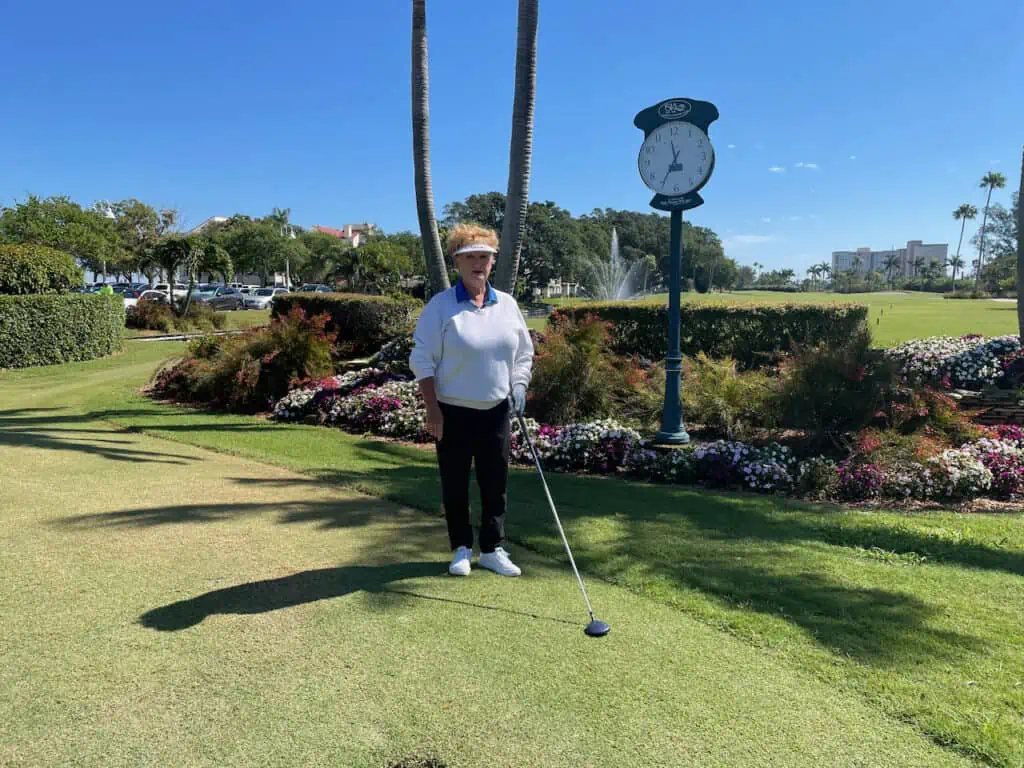Table of Contents
Feel like you’re in a golf slump? Then you’ll want to read this personal article on a common issue that affects most golfers, including Colleen Gilbert.
The Dreaded “S” Word
In my book the worst word in golf begins with the letter S; no it is not shank or slice, it is the word slump. Now there is a word for you.
The meaning of the word slump, according to Merriam-Webster, is “to drop or slide down; or collapse.”
Yep, that about nails it. The golf slump is the collapse of a perfectly good game for an extended length of time for no good reason.
Now I am not talking about a physical injury that affects your golf game. This is a whole different animal, this is a drop in mental and/or physical skills, making you lose confidence, creating extreme tension, and frustrating you to the point of madness. Quite a thing, eh?
Well, golfers of all levels and ages experience this terrible affliction every so often; enough that it deserves talking about.
⛳️ Read Next: Callaway Supersoft vs Supersoft Max | Which is Best?
What Happened to My Golf Game?

I happen to know firsthand all about slumps. I have been unfortunate to have had many in my life and right now I am in the midst of one. It hurts even to write this.
Last November, I had the lowest handicap of my golf career. I finally achieved a 12 handicap during the summer months and was playing consistent golf.
Then the holidays came around, and I was not playing golf as often as I was in the summer. January rolled around, and my golf game was gone. I went from a 12 to a 16 handicap in no time. What the heck had happened?
It is now March and things are not much better but I am working on it. Since January I have taken three golf lessons from three different golf pros to help fix my fairway woods.
Apparently, I should not have done this, as I have been told by a friend of mine. She commented that trying to correct the problem and learning three different ways to do it probably made my slump worse.
This was good advice, and the teaching pros would agree; that hopping from one pro to another in hopes of learning the magic golf swing is not very proactive.
Overcoming a Golf Slump
Finding the right pro is for another article, but settling and staying with one teacher is no doubt the best way. As you are working on your golf slump, it has been suggested to work on your short game.
Work on Your Short Game
The short game for me has always been rather boring and something that I don’t necessarily like to work on. I normally focus on getting on the green in regulation and if I get lucky enough to be close to the pin this is a bonus.
This is not the best way of looking at it. In reality, I should hone my short game to get close to the pin on a regular basis, not my usual hit-or-miss routine. So working on the short game can boost your confidence and help lower your scores.
Don’t Overthink Your Shots
Overthinking is one of my worst enemies in golf. Boy, can I overthink the shot. I am probably like a lot of golfers who have a normal checklist that they think about as they are getting ready to hit a shot. You know the usual; head down, arms extended, follow-thru, etc. etc. etc.
Unfortunately, my checklist grows to extraordinary amounts when in a golf slump. My mind is spinning with things that I should do or not do while taking my back swing. Now, I can tell you this is a recipe for disaster.
Not only may the checklist in my mind be wrong, but there may also be too many things to remember. Instead, work with your golf pro for a pre-shot drill that works for you. This will help you get your “ducks in order” by making an effective routine of your pre-shot. This concentration will help to focus your mind on the routine and take away the little hamsters running around in your brain.
Golf Swing Tempo
Slow your swing down. I know when I get uptight and frustrated the first thing I do is overswing. If they gave a prize for fast and thrashing swings when I am frustrated I would win first prize. Slow down and see what happens.
Don’t keep score for a while. Go out and play a round or two, hit a couple of extra balls if you like and don’t worry about the scorecard. Enjoy being outside, so why muck it up by keeping score. Relax and enjoy! Golf is supposed to be fun, remember.
Take a Break
My friend says take a break and don’t play for a while. I am not sure this is the best advice for me; as I feel this was the reason I am in this predicament, but for many taking a break may be just the ticket. Take some time off for a while and perhaps forget some of the bad habits.
⛳️ Read Next: Golf Mental Game: 8 Tips to Master the Mental Side of Golf
Final Thoughts
For me right now I am desperately trying to emphasize on being positive and not getting in my “Debbie Downer” mood. I started to tell myself that I am a good golfer instead of constantly berating myself.
This is a new theory for me, but I believe it may have helped on Friday when I played. Go figure, maybe I am on my way out of my slump. Sssh, I won’t say that too loud as I know the Golf Gods may be listening and think I am getting too confident.
Frequently Asked Questions
What is a Golf Slump?
A golf slump refers to a period of time when a golfer is struggling with their golf game and is not performing up to their usual handicap. It can be characterized by a decline in performance, loss of confidence, and difficulty in executing shots.
What Causes a Hitting Slump?
Golf slumps can be caused by a variety of factors, including a golf injury, changes in your swing, lack of practice, and mental game pressure to perform. A golf slump can be frustrating and discouraging, but it is a common issue among most golfers.
What to Do When You Are in a Hitting Slump?
To overcome a golf slump, golfers may need to make adjustments to their training routine, seek advice from a golf professional, and work on their mental game. You may also need to take days off. It’s important to remember that a golf game slump is temporary, and with the right approach, golfers can regain their form and get back to playing their best.

